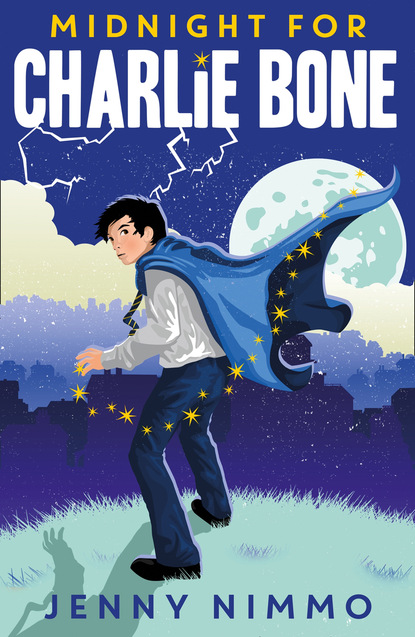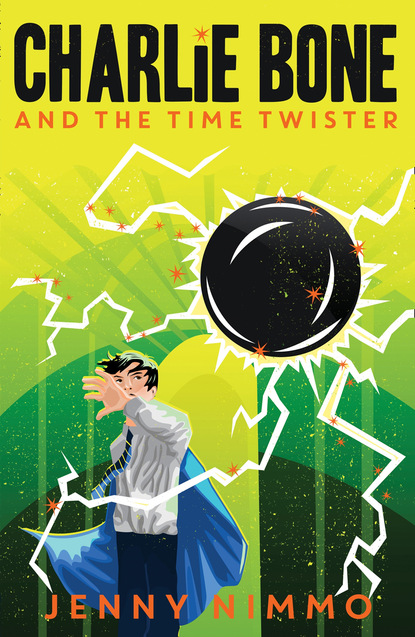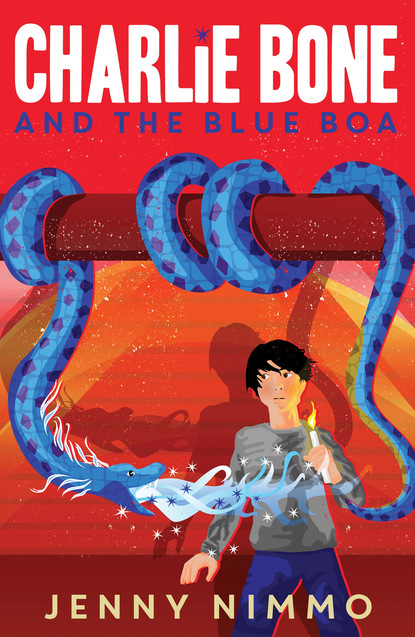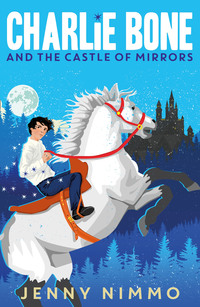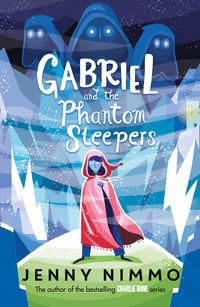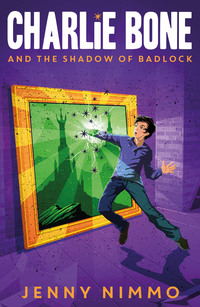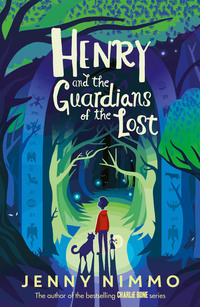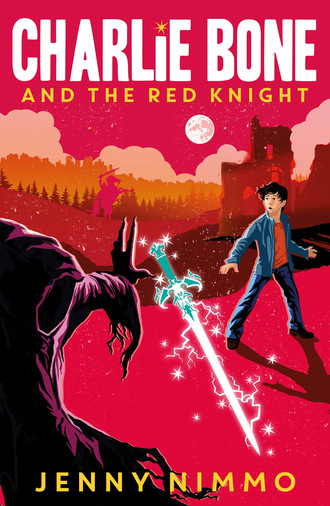
Полная версия
Charlie Bone and the Red Knight
‘Must I die a second time?’ Tancred whispered dismally.
There would be no witnesses. The city seemed deserted, even the noise of traffic had died away; the only sound that Tancred could hear was a faint clattering, which he mistook for his own beating heart. But the clattering grew louder. And now the sound resembled hoofs cantering on stone, and then a voice cut through the night, ‘ASHKELAN!’
The swordsman whirled round and Tancred blinked in amazement as a knight on a white horse charged into the square. The knight was dressed from head to foot in glittering chain mail; he wore a helmet of polished metal with a plume of red feathers flowing from its crown, and a red cloak that billowed behind him like a sail. In his right hand he wielded a bright sword, the hilt encrusted with glittering jewels, and the shield that hung from his saddle was emblazoned with a burning sun.
‘You!’ grunted the man called Ashkelan; holding his sword aloft, he rushed at the knight.
With one blow of his own weapon the knight swept the sword from his assailant’s hand, and it rattled over the cobblestones. There was a scream of pain, followed by a roar of anger as the owner of the sword fell to the ground, clutching his arm.
A stream of mysterious and indecipherable words issued from the man as he reached for his sword. Tancred had been about to run from the scene but he stood rooted to the spot, scarcely able to believe his eyes. For all at once the fallen sword was in the air and flying towards the knight. Lifting his weapon, the knight parried the blow that would surely have severed his arm, but the enchanted sword came at him again, and again he fought off the blow. An extraordinary duel was taking place and, frightened as he was, Tancred could not bring himself to leave the square.
The knight and his mount seemed almost to be one, for the horse turned in a flash. It leapt high above the fountain and raced around the square, its hoofs moving in a cloud of sparks. The enchanted sword, now a flying streak of light, attacked the knight from every angle. How he managed to fight off such a battery of lightning blows, it was hard to comprehend. And then, at last, came the strike that might have finished him. It fell across his chest, slicing through the chain mail and drawing a deep grunt of pain from the knight. But with a mighty upward thrust he caught the enchanted sword and set it spinning into the sky.
Tancred didn’t wait for the sword to fall to earth. Astounded by what he had seen, he tore down the alley and on to the High Street. Fear and excitement caused great gusts of wind to whistle round his head; his hood blew back and the air above him fizzed with blue and white sparks. He reached Frog Street and ran towards the Pets’ Café, calling, ‘Mr Onimous, let me in!’
A tall man stepped out of the shadows and Tancred ran straight into him. With a moan of defeat the weather-boy closed his eyes and dropped to the ground.

Lord Grimwald arrives
Charlie Bone had been fast asleep. Now, suddenly, he was not. There were voices in the courtyard below. Charlie got out of bed, crossed the dormitory and looked out of the window. Two men were moving towards the main doors of the Academy. One Charlie recognised as Norton Cross, the doorman at the Pets’ Café. He was half-dragging, half-carrying a smaller person in a large hat with a drooping feather at the back.
‘Grief!’ muttered Charlie. He couldn’t see the face of the man beneath the hat, but he was groaning horribly. Charlie opened the window, just a crack, so that he could hear what was going on.
‘Ssssh!’ hissed Norton. ‘You’ll wake the whole school, sir.’
The two men climbed the steps to the main doors and Norton rang the bell. A moment later there was a loud rattle and one of the doors opened. Weedon the porter stood on the threshold. He was a bald, stocky man with a sour face.
‘I thought he wasn’t supposed to go out yet,’ said Weedon.
‘He wanted to see the city.’ Norton dragged his companion through the door.
‘What’s the matter with him?’ asked Weedon, frowning at the sword that danced past him.
The door was closed before Charlie had a chance to hear Norton’s reply. But then his attention was drawn to a second arrival. Three women came through the arched entrance and crossed the courtyard. Grizelda Bone’s imposing beak of a nose led the way. Grizelda was Charlie’s grandmother. Her sisters, Eustacia and Venetia, came close on her heels. All three were tall and lean, their dark eyes small, their black brows thick and heavy. Grandma Bone’s hair was a startling white, Venetia’s black, Eustacia’s somewhere in between.
Charlie watched them climb the steps, his grandmother teetering very slightly in her high-heeled boots. As she rang the bell, Eustacia, for no good reason, suddenly looked up at the window where Charlie stood.
Charlie backed into the shadows. Eustacia boasted that she was clairvoyant, though Charlie was not entirely convinced. Her power could wax and wane. Tonight it appeared to be waxing.
To complicate matters the dormitory door was suddenly flung open and Charlie was caught in a strip of light from the passage. The matron, Grandma Bone’s third sister, Lucretia, stood silhouetted in the doorway. ‘What are you doing out of bed?’ she demanded.
‘Er, getting some air,’ Charlie said feebly.
‘Air? There’s enough air in here to fill the lungs of a thousand boys, let alone twelve.’
‘Is there?’ Charlie looked round at the eleven boys sleeping behind him. Not one had woken up, even though the matron had made no attempt to lower her voice.
‘Get back to bed!’
Without waiting for Charlie to obey, the matron closed the door. Her footsteps receded so fast Charlie imagined she must be running down the passage. In the two years he had been at the Academy he had never known his great-aunt Lucretia to run. Tonight she must either be escaping from something unpleasant, or she was late for a very important meeting.
And who would be holding a meeting at such a late hour? Only Ezekiel Bloor, Charlie decided. At a hundred and one years old, Ezekiel made no distinction between night and day. He spent his mornings dozing in his wheelchair and afternoons reading up on unpleasant spells. It was only at night that his malicious mind really came alive, and then woe betide anyone who didn’t fit in with his plans.
Charlie was about to close the window when a curious smell drifted up to him: a salty, seaweedy tang that left its taste on the tongue. It was horribly familiar. Looking down into the courtyard he wasn’t surprised to see a large figure appear in the archway. The man wore an oilskin coat and long fisherman’s boots. He moved over the cobblestones with an odd swaying stride, as though he were on the heaving deck of a ship.
Charlie raced back to his bed. Before he climbed into it, however, there was a husky whisper from the bed at the end of his row.
‘The window. Close the window.’
Charlie pulled the bedclothes over his head. He could hardly bear to look at Dagbert Endless, let alone talk to him. Dagbert kept protesting that Tancred’s near-drowning had been an accident. Even the headmaster believed his story. The school had been told that Tancred Torsson had accidentally slipped in the Sculpture room, and been drowned by water pouring from a broken tap. Charlie knew better. Dagbert was a drowner. He even boasted of his power. But neither he nor the Bloors were aware that Tancred had survived. Tancred’s friends intended to keep it that way.
‘The window. Close the window.’ This time the voice was louder. The seaweedy smell from outside mingled with the fishy stench that Dagbert sometimes gave off.
Charlie held his nose and lay still.
‘CLOSE THE WINDOW!’
The shout woke half the dormitory. Some of the boys yawned sleepily and turned over, but Bragger Braine, the bully of the second year, sat up and grunted, ‘Who said that?’
‘I did,’ Dagbert answered in an aggrieved tone. ‘Charlie opened the window and he won’t close it.’
‘Close the window, Charlie Bone,’ Bragger commanded.
His ardent follower, Rupert Small, echoed his words in a thin reedy voice. ‘Close the window, Charlie Bone.’
Charlie held his breath. He was determined not to obey Bragger Braine or his pathetic crony.
‘CLOSE THE WINDOW!’ shouted Dagbert.
This shout woke Fidelio Gunn in the bed next to Charlie. ‘Stop bellowing, Fish-boy!’ he cried, punching his pillow into shape. ‘Let normal people get some sleep.’
For a few seconds silence reigned. Charlie smiled to himself in the dark and whispered, ‘Well done, Fido!’
The whisper irritated Bragger. If his bed had been beside Charlie’s he would have thumped him. But they were half a dormitory apart and a day of thumping other people and starring on the football pitch had exhausted Bragger. He just wanted to go to sleep. The next time Dagbert repeated his demand, Bragger said, ‘Close it yourself, Fish-boy!’
Charlie waited for Dagbert to slip out of bed and close the window, but the fish-boy didn’t move. Soon the room was filled with the soft rhythmic breathing of heavy sleepers. Charlie turned over and closed his eyes.
Minutes passed. Try as he might, Charlie couldn’t sleep. A soft light insisted on creeping through his eyelids. He half-opened one eye. A bluish glow was spreading across the walls; a luminous rippling gleam, like the water in a swimming pool. Charlie screwed his eyes tight shut, trying to wish away the eerie light. This was what happened when Dagbert was nervous or excited. Perhaps he sensed Lord Grimwald’s arrival. Charlie knew that Dagbert was afraid of his father; they seldom saw each other, for Lord Grimwald rarely left his gloomy castle in the Northern Isles.
At the far end of Charlie’s row a bed creaked, and he heard quick footfalls on the bare floorboards. Someone slammed the window shut but no one woke up. Charlie curled himself up and began to drift into sleep. And then something heavy sank on to his bed, just below his knees, and a voice whispered, ‘Charlie, are you awake?’
No. I am asleep, Charlie told himself. He didn’t stir.
‘Charlie, wake up.’
He could have remained as he was, motionless, his eyes closed, but sudden anger made Charlie sit up and whisper harshly, ‘What is it?’
‘My father’s here,’ said Dagbert, his quiet voice husky and urgent. ‘I can smell him.’
‘And I can smell you,’ Charlie grunted. ‘Get off my bed.’
‘Charlie, I think I might need your help.’
‘What?’ Charlie exclaimed. ‘Me help you, after you drowned my friend?’
‘It was an accident.’ Dagbert’s whisper became a low whine. ‘I didn’t mean to.’
‘Oh, you meant to, all right,’ Charlie growled. ‘Emma Tolly saw everything. Now get off my bed.’ He kicked Dagbert in the back.
Dagbert stood up, but he didn’t move from Charlie’s side. Charlie could see his rigid form silhouetted against the glimmering blue-green wall. At last a soft grumble of words came tumbling from Dagbert. ‘You know our secret, our family curse. You know that my destiny is to die in my thirteenth year – unless my father dies before me. It has to be one of us, and now he’s here, unexpectedly, in the night, and I am twelve, Charlie. So what’s going to happen? Find out for me, please. No one else is like you, Charlie. No one else would do it.’
‘Do it yourself,’ muttered Charlie. Turning his back on Dagbert, he wriggled under the bedclothes.
Seconds passed before Dagbert said dully, ‘I’m afraid.’
‘Too bad,’ Charlie replied.
‘But I want to know why my father’s here.’
‘Well, I don’t. Not interested.’ Charlie pulled the bedclothes over his head. He waited for Dagbert’s response, but none came. Before falling asleep, Charlie opened his eyes briefly and found that the dormitory was in darkness again. Hopefully Dagbert had gone back to bed.
Charlie hadn’t been quite truthful with Dagbert. He was interested in Lord Grimwald’s arrival. In fact, he was very curious about everything that he had seen from the window that night. He just wasn’t quite curious enough to risk being caught by some of the school’s unpleasant-looking visitors.
In a dark passage leading off the great hall, two highly polished ancient doors opened into a magnificent, but seldom used, ballroom. Tonight the ballroom had been filled with chairs, and Ezekiel Bloor’s visitors sat in rows beneath four glittering chandeliers. The brilliant light reflected in the crystals was rather disconcerting to some of Ezekiel’s unwholesome-looking guests. They were people who were happier in shadow: thieves, poisoners, fraudsters, kidnappers, swindlers and even murderers. Most of them lived in Piminy Street, a narrow road in the ancient part of the city. Once it had been inhabited by magicians, sorcerers, warlocks and the like. Indeed, among the villains seated in the ballroom that night, there were those who had inherited the talents of their notorious ancestors. Prominent among them was a clairvoyant named Dolores Slingshot, so named because of her deadly accuracy with a catapult. Dolores was eighty years old and wore a wig of claret-coloured ringlets.
In a corner at the back of the room stood a huge white cube. Even in a corner it seemed to dominate the room. Everyone who entered eyed the cube with surprise and curiosity. As well they might, for it was hard to understand how the great white square had managed to get itself down the narrow passage outside. In fact, it hadn’t. Weedon had been forced to open up the disused doors at the side of the ballroom and push the cube (with the help of four removal men) through the garden and into the room. The whole process had been extremely difficult and exhausting. Even Weedon didn’t know what lay beneath the cladding. The visitors wondered if they were about to find out.
The last person but two to arrive was a sickly-looking arsonist called Amos Byrne. When he had taken his place, Weedon closed the doors and all eyes turned to the stage.
The grand piano had been pushed to the back and in its place stood an oval table covered with a purple cloth. At one end of the table an ancient man in a wheelchair sat grinning at the audience. Ezekiel Bloor’s white, waxy hair framed a face so gaunt and bony it looked more like a skull than the face of a living person. Next to him, and not smiling at all, his great-grandson, Manfred, sat slightly turned from his neighbour, an ashen-faced woman with strands of grey hair and a nose as blue as a bruise.
At the other end of the table, the headmaster, Dr Harold Bloor, was in the middle of a long, extremely boring speech when another guest arrived. He was a well-muscled man wearing only a string vest and camouflage trousers. He took a chair at the back, twirled it in one hand and brought it to rest with a loud bang. The headmaster glared at the latecomer and then resumed his speech. It went on for another ten minutes before grinding to a halt, and those of the audience who hadn’t fallen asleep were able to applaud.
The applause didn’t go on for as long as the headmaster would have liked, however, because the doors suddenly crashed open and a strong salty smell wafted into the room, followed by a large man.
‘Lord Grimwald!’ Dr Bloor’s mouth hung open. ‘We didn’t expect . . . that is to say we hardly dared to hope that you would arrive today. As you see, your . . . your . . .’ he pointed to the cube.
‘Sea Globe.’ Lord Grimwald smiled at the cube with satisfaction. ‘Well, I’m here now, so get on with it.’ He swayed down the narrow aisle between the seats as though his legs were of different lengths. His crinkled grey hair was streaked with a seaweedy green and his eyes were an icy aquamarine. The strong, salty smell that accompanied him caused several people to sneeze and cough.
‘We have already covered several issues,’ said Dr Bloor, ‘but I have not yet introduced –’
‘Yes, yes. Go on.’ Lord Grimwald climbed the steps up to the stage and Manfred, leaping up, hastily pulled an extra chair between himself and his neighbour.
Lord Grimwald sat down heavily on the empty chair. ‘Grimwald,’ he said, extending his hand to the woman on his left.
She took the eel-like fingers with a barely concealed look of distaste. ‘Titania Tilpin,’ she said, rising to her feet. ‘I am about to speak.’
Everyone in the room appeared to know Titania and wild applause broke out. She gave her audience a gratified smile and said, ‘I know what you are expecting and I shall not disappoint you.’
More applause. The headmaster frowned. He had not received such generous applause. ‘Allow Mrs Tilpin to speak,’ he said.
The woman smiled and drew from the folds of her sparkling black cloak a round mirror set in a jewelled frame. The mirror glass blazed so brilliantly some of the visitors had to cover their eyes. And then, with blissful sighs, the spellbound audience fell silent.
‘The Mirror of Amoret,’ announced Mrs Tilpin. ‘Most of my audience have seen it already, but for your benefit, Lord Grimwald, this mirror was made by the Red King for his daughter Amoret. It is nine hundred years old.’
‘And is an aid to travel,’ Lord Grimwald interrupted in a bored tone. ‘Yes, I’ve heard of it.’
‘Much more than an aid,’ Mrs Tilpin said indignantly. ‘I have only just begun to understand its many properties. Formerly I have used it to bring my ancestor, the enchanter Count Harken, into the city. He was eventually driven back into his own world – I won’t go into detail – but I have hopes that he can return again. Now, I have something to show you all.’ She turned and, tossing back her sequinned cloak, held the mirror so that its radiant light was beamed on the wall behind her.
A glowing circle appeared on the wall. It grew to the size of a small table. And then, within the circle, the fuzzy contours of plants and trees appeared. As a green jungle came into focus, a boy could be seen, wandering through the trees with a tiger at his side. The boy had snow-white hair and thick-lensed spectacles. Unfortunately a jagged line ran diagonally across the scene, cutting it in two.
‘Your mirror is flawed,’ Lord Grimwald observed.
‘Charlie Bone did it,’ snapped Mrs Tilpin. ‘Infernal boy. I had a promise from Ezekiel here that he would help to mend it. But, so far, his promises have come to nothing.’
‘I am old, Titania,’ Ezekiel protested. ‘My magic is waning and I must conserve my strength. I told you to consult Dorcas Loom. She can do it, I am certain.’
‘It is of no consequence,’ Lord Grimwald said with a yawn. ‘We can see the boy well enough. Continue, Mrs Tilpin.’
‘Of no consequence!’ Mrs Tilpin glared at Lord Grimwald. She shook her shoulders like a hen ruffling her feathers and the black cape sparkled. ‘My mirror is of great consequence.’
‘Of course, of course, Titania,’ said the headmaster. ‘Tell us more – our audience is waiting.’
With a defiant look at Lord Grimwald, Mrs Tilpin pointed to the white-haired boy. ‘Billy Raven,’ she said, ‘and a tiger that is not a tiger – an illusion conjured up by the enchanter to entertain the boy.’
Ezekiel gave a sudden cackle. ‘How delicious to see the little wretch trapped in Badlock, never to return. Never to claim his inheritance. There’s a will, you see, my friends.’ He wheeled himself to the front of the stage and addressed the audience directly. ‘That’s where you come in. The document is signed by my great-grandfather, Septimus Bloor. It leaves all his land, his treasures and even this house, to his oldest daughter, Maybelle, and her heirs. Her only remaining descendant is Billy Raven,’ Ezekiel turned his chair and pointed to the wall, ‘still strolling through the enchanted jungle. Billy is unaware, you see, and only I know the truth because it was told to me by my great-aunt Beatrice, a witch, who poisoned Maybelle and forged a false will leaving everything to my side of the family. But the real will still exists.’ Ezekiel banged the arm of his wheelchair with surprising vigour. ‘And I believe that Lyell Bone, father of Charlie, has hidden it.’
At this point Manfred stood up and, leaning over the table, declared, ‘It must never be found by anyone outside this room. Do you understand?’
A low murmur broke out. There were enthusiastic nods and cries of, ‘Never!’ and ‘We’ll see to it!’
‘See to it you must,’ said Manfred, his dark, hypnotic gaze travelling over the assembled villains. ‘Find it you must. Destroy it we must. Lyell Bone is at sea, hopefully never to return.’ He glanced at Lord Grimwald. ‘But he might have passed a hint, a clue to his son Charlie. We will deal with the boy. You must find the will.’
‘Carefully, mind,’ said Dr Bloor. ‘Nothing violent. We don’t want to cause suspicion or alert the law. The Pets’ Café is a good place to start. Councillor Loom and Norton Cross,’ he looked at Norton in the front row and Norton gave a nod, ‘they have helped us to close the place. Once the owners are evicted you can search the café. There may be a tunnel that leads to the castle ruins. Find it! Investigate!’
‘I’ll do it,’ said Amos the arsonist.
‘And me,’ called the man in the string vest. ‘I’m very nimble, me.’
‘Don’t cause suspicion,’ warned Dr Bloor.
‘Rewards?’ piped up Dolores, tossing her red ringlets. ‘What do we get for helping you?’
‘Money,’ said Ezekiel. ‘Lots of it. What else would you want?’
‘Money’ll do,’ said Dolores. ‘Ten thousand if I find the will.’
Ezekiel scratched his long nose, wondering if he could eventually go back on his word. ‘Ten thousand,’ he agreed, somewhat reluctantly.
‘A thousand for trying!’ demanded a white-haired man in a purple suit; an illusionist by the name of Wilfred Coalpaw.
Dr Bloor shook his head. ‘Just for trying? It’s rather –’
‘Agreed!’ cried Ezekiel, who had decided that going back on his word wouldn’t be too difficult. ‘A thousand for each of you. There’ll be plenty to go round if we find where Septimus hid the rest of his treasure. You can go now.’ He waved his hand dismissively.
There was a great deal of scraping, stamping and shuffling as the audience rose from their seats and made for the door. A few of them cast curious glances at the white cube. A sound came from it. Waves perhaps. There was the faint rustle of a tide rolling on to a stony shore.
‘By the way,’ called Manfred, as though to distract them, ‘Ingledew’s Bookshop. Keep an eye on it. Get in there if you can. Old tomes make good hiding places.’
The guests murmured among themselves and left the room.
Six people remained sitting in the front row: Grizelda Bone and her three sisters on one side of the aisle, Norton Cross and the swordsman on the other.
‘Bring us some tea!’ Dr Bloor demanded when Weedon poked his head round the door.
‘And biscuits,’ added Ezekiel. ‘And cake!’
‘For all of you?’ asked Weedon, counting heads.
‘All,’ said Dr Bloor. ‘Eleven, to be precise.’
With a bad-tempered mutter, Weedon withdrew his head and closed the doors.
‘At last, the elite.’ Ezekiel beamed down at his six remaining guests. ‘Now we can discuss things more . . . comprehensively. Ashkelan Kapaldi, welcome!’
The swordsman stood and bowed deeply, first to the stage and then to Grandma Bone and her three sisters. He was a very colourful figure with his wide lace collar and emerald-green tunic, embroidered with gold. His cuffs were made of lace too, and his breeches were green velvet. Wide leather boots reached almost to his thighs, and a scarlet cummerbund encircled his waist. A broad leather belt hung diagonally across his chest from his shoulder to below his waist, and attached to this was a dark green scabbard.


